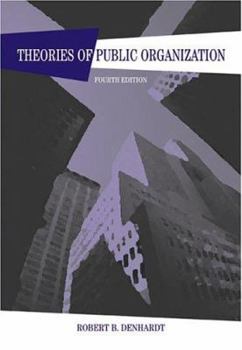Theories of Public Organization
Select Format
Select Condition 
Book Overview
Comprehensively examining the main-stream literature in public administration theory, Denhardt includes a balanced treatment of policy studies and action theory/critical theory whilst seeking to... This description may be from another edition of this product.
Format:Paperback
Language:English
ISBN:0534612172
ISBN13:9780534612177
Release Date:March 2003
Publisher:Wadsworth Publishing Company
Length:221 Pages
Weight:0.90 lbs.
Dimensions:0.5" x 6.5" x 9.1"
Customer Reviews
1 rating
Concise and Powerful
Published by Thriftbooks.com User , 21 years ago
Denhardt's "Theories of Public Organizations" is a concise overview of public administration theories that have had contributed to the substantive mosaic of the field of public administration. Along a continuum ranging from the early contributors to the contemporary accounts in public administration, including scholars of different epistemological persuasions, Denhardt introduces the readers with mouthwatering fecundity of public administration theory/theories.Denhardt organizes the book around eight major chapters. In the first chapter, the author persuades the reader of the close connection between theory and practice and argues that theory is derived from practice, therefore, how we acquire knowledge in practice and make sense of what is happening around us is important in theory building in that the way we learn helps us to come up with theories that explain what happened and why happened. In the second chapter, Denhardt discusses the intellectual heritage of Marx, Weber, and, Freud, all of whom concluded that complex organizations have important influences on the development of human faculties, for this reason, Denhardt argues that public administration scholars need focus on human issues when spending intellectual energy on public organizations. In chapter 3, the beginning of public administration theory is discussed with special emphasis to "efficiency" as the primary criterion of success (I strongly recommend Deborah Stone's Policy Paradox!). Chapter 4 discusses the rational model of organization. Chapter 5 is about organizational humanism and New Public Administration. In the sixth chapter, Denhardt talks about the New Public Management movement. In Chapter 7, New Public Service is recounted. The eighth chapter is a summary that emphasizes the intimate connection between theory and practice.Beginning with targeted quotations from Marx, Freud, and Weber, Denhardt argues that large-scale organizations have significant influence on the lives of human beings, because of which one needs to go beyond a simple-minded view that organization theory is about how to increase productivity, a question that addresses only instrumentally-rational managerial techniques, without any palpable regard to personal learning and growth of individuals that populate complex organizations. Drawing from a broad range of public administration literature and epistemological movements that include interpretive/action theory, critical theory, and postmodernism, Denhardt comes up with a viewpoint that public administration scholars should contribute to a theory of public organization that makes a significant emphasis on personal learning, human values and action, and change in public organizations in pursuit of publicly defined societal goals. Although the book is a generic one that gives a copious account of contributions to public administration theory, Denhardt accomplishes getting the core of his message across: there is (and should be) an intimate connection betwe





